#Bengali Authors
Explore tagged Tumblr posts
Text
Chirakaler Chhara by Sunil Jana PDF
Chirakaler Chhara Rhymes books by Sunil Jana PDF. Book – Chirakaler Chhara, Edited Author – Sunil Jana, Format – PDF, Book Pages -240, PDF Size – 4 MB, Genre – Bengali Rhymes Books, Edited Book, Digital published by Digital Library of India, Sunil Jana edited the child rhymes book Chirakaler Chhara The rhymes book ‘Chirakaler Chhara’ is compiled by writer Sunil Jana. Many writers have written…

View On WordPress
0 notes
Text
অধিকারলাভের যে মর্যাদা আছে, সেই মর্যাদা রক্ষা করিতে হইলে অধিকারপ্রয়োগকে সংযত করিতে হয়। যতটা পাওয়া যায় ততটা লইয়া টানাটানি করা কাঙালকেই শোভা পায় — ভোগকে খর্ব করিলেই সম্পদের যথার্থ গৌরব
- রবীন্দ্রনাথ ঠাকুর (চোখের বালি)
Video credit : Social media platform
#chokher bali#Rabindranath Thakur#rabindranath tagore#love#novel#pain#authority#desiblr#desi tumblr#me#desi teen#quotations#desi academia#being bengali#bengali song#bengali movie#aishwarya rai#aish#movie#bengali#ভালোবাসা
10 notes
·
View notes
Text
“আমি যাহাকে কেন্দ্র করিয়া ঘুরি, না পাই তার কাছে থাকার অধিকার, না মেলে দূরে যাওয়ার অনুমতি।”
~শরৎচন্দ্র চট্টোপাধ্যায়
Translates to- "Whom I revolve around, I do not get the right to stay near, I do not get the permission to go away."
#writers and poets#qoutes#bengali poetry#bengali#bengali qoutes#writers#writerscommunity#writerscreed#authors#authors on tumblr#shorotchondro#শরৎচন্দ্র চট্টোপাধ্যায়#উক্তি#বাংলা#লেখক#উপন্যাস#writeblr
12 notes
·
View notes
Text
"Who are you, reader, reading my poems an hundred years hence? / I cannot send you one single flower from this wealth of the spring, one single streak of gold from yonder clouds. / Open your doors and look abroad."
Read the English translation here
Read The Gardener in English through Project Gutenberg here
Reblog for a larger sample size!
#i cannot find the original bengali#or the original author#it seems like there is no one original poet for the book#according to project gutenberg /the gardener/ is a collection of english translations of bengali poems#mostly from a book called#gitanjali#closed polls#polls#poetry#poems#poetry polls#poets and writing#tumblr poetry#have you read this#poem 85#poem 85 the gardener#the gardener#rabindranath tagore#bengali poetry
4 notes
·
View notes
Text
10 Best Songs of Arijit Singh

#changed into a decent scholar#but cared greater about song#Fame Gurukul#Tum Hi Ho#His maternal uncle played the tabla#and his mother also sang and played the tabla. He studied at Raja Bijay Singh High School and later on the Sripat Singh College#a University of Kalyani affiliate.According to him he and his dad and mom decided to teach him professionally.#He was taught IndiArijit Singh was born on 25 April 1987 in Jiaganj#Murshidabad#West Bengal to Kakkar Singh#a Punjabi Sikh father and Aditi Singh#a Bengali Hindu mother. His paternal circle of relatives came from Lahore in the course of the Partition and in this we also tell about the#and his maternal grandmother used to sing.#an classical song via Rajendra Prasad Hazari and educated in tabla with the aid of Dhirendra Prasad Hazari. Birendra Prasad Hazari taught h#he started training beneath the Hazari brothers#and at the age of 9#he got a scholarship from the authorities for training in vocals in Indian classical tune.#Arijit Singh#a call synonymous with soulful melodies and heartfelt renditions#has etched an indelible mark on the Indian song panorama. Hailing from Jiaganj#West Bengal#his adventure to stardom is a testimony to raw records and unwavering perseverance. Emerging from the crucible of truth television#wherein he showcased his vocal prowess on Singh's career trajectory took a huge turn on the equal time as he have come to be an assistant t#His soar ahead arrived with the coronary coronary coronary heart-wrenching numbers “Tum Hi Ho” and “Chahun Main Ya Naa” from the blockbuste#imbued with raw emotion and a vocal range that results traversed from sensitive whispers to effective crescendos#catapulted Singh into the limelight.#His functionality to seamlessly combine classical influences with modern tunes gave beginning to a totally particular sound that resonated#Singh's repertoire is a testimony to his versatility as an artist. From the melancholic pathos of songs like “Tere Bin” to the infectious p#he has examined his mettle over and over. His voice#a rich tapestry of emotions
0 notes
Text
I can’t write anything in any languages because I am very stupid but one thing I can write about is the realisation in my early twenties around the limitations of English because when you grow up surrounded by English as a primary language you are told so often that it is the language of the greatest writers of all time, that it is the language of poetry and novels etc.
And I think it’s very easy to buy into that because of the hype around some of our great writers who are really… great!
But then! You start to learn about the world lmao. You start to learn about the precision of Polish prose in novels and the very deliberate ways of communication in plays that are so much more rigorous than the English conventions. You watch a play in the original Norwegian and realise there’s all this tonal play happening that you missed in English. You start to read Russian novels where people talk three different languages to denote social class and communication styles. You start to notice a particular kind of narrative convention in Swedish novels and Colombian novels that aren’t in British novels and you start to wonder how much more you’re missing in translation. You learn of the term “anglosphere” that East Asian authors use to describe the very limited rules that the UK and America have put onto storytelling, and how Bengali has a formal language that exists solely for poetic expression and philosophical thought that has almost never been properly translated into English because it can’t be.
And then you remember there’s a word in your own family’s language in the UK which has no direct translation to English too.
#read in translation lol and marvel at the world of translators for real but also#go see plays you know well in their original language and find a whole new layer of aural play
72 notes
·
View notes
Text
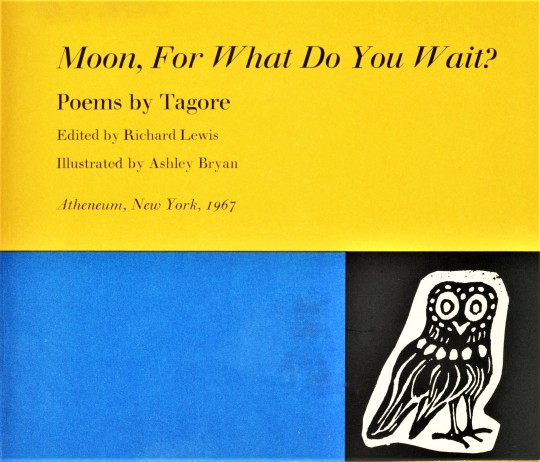
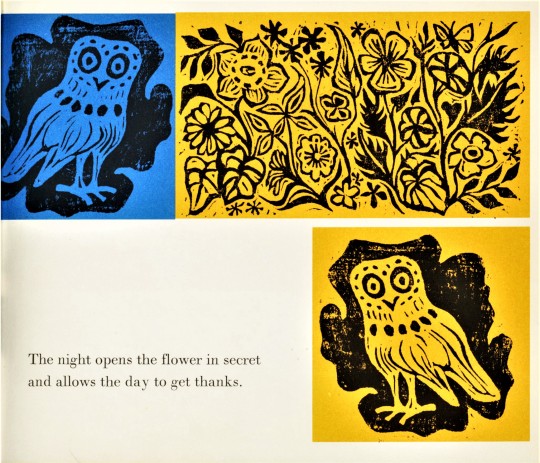


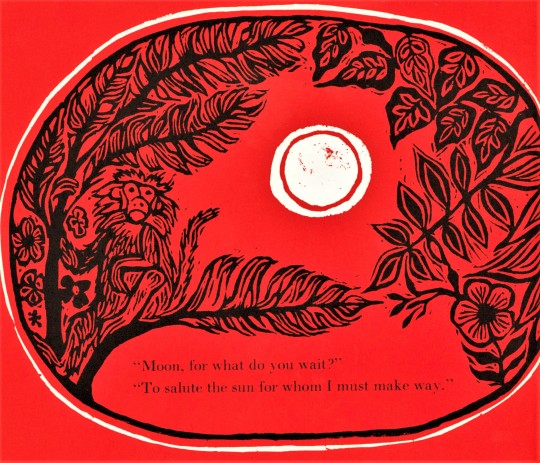
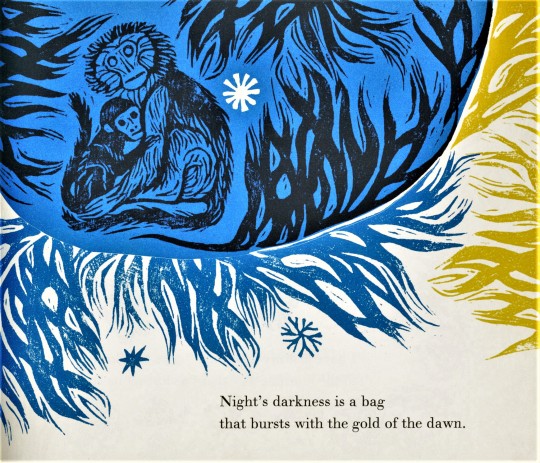



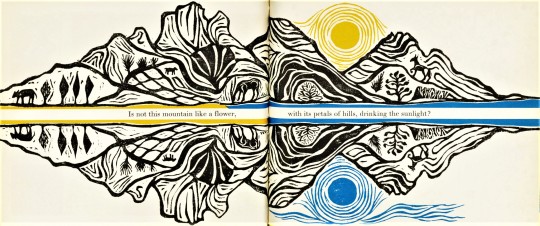
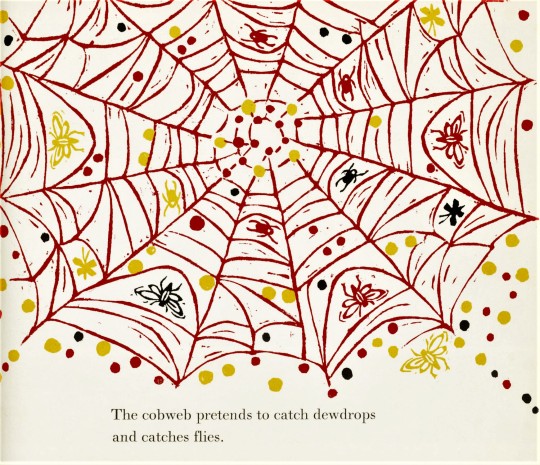

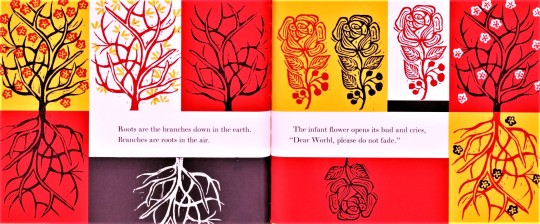
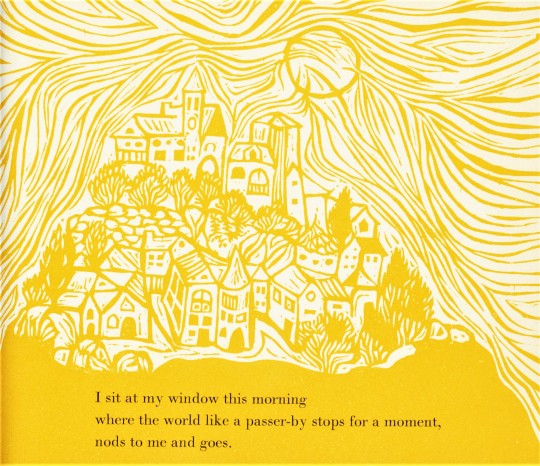
National Poets Day
On this National Poets Day, August 21, we celebrate the work of Bengali poet Rabindranath Tagore (1861-1941). Tagore began writing poetry as a child and remained committed throughout his life to exploring the natural and spiritual world through poetry and prose. He was known as the “Bard of Bengal” and in 1913 became the first non-European to be awarded the Nobel Prize in Literature for his collection of poetry Gitanjali.
Within the Special Collections we hold the first edition of Moon, For What Do You Wait?, a collection of Tagore poems from his 1916 publication Stray Birds which consisted of 326 verses. Published in 1967 by Atheneum, Moon, For What Do You Wait? was edited by Richard Lewis, director of the Touchstone Center for Children in New York City, with illustrations by award-winning artist and author Ashley Bryan (1923-2022). Lewis manages to whittle down Tagore’s lines without losing any of the imbued wonder and delight present in the original publication. Accompanied by Bryan’s bold illustrations, readers are encouraged to let their eyes wander over the pages, getting lost in prose and imagery.
View more poetry posts.
-- Jenna, Special Collections Graduate Intern
#National Poets Day#rabindranath tagore#moon for what do you wait#poets day#ashley bryan#richard lewis#atheneum#tagore#stray birds#poems#poetry#children's books#Historical Curriculum Collection
248 notes
·
View notes
Text
intro post <3
don't mind me editing this like every single day lol
my dm's and askbox is always open if u want to talk <3
anons are welcome too <3
also if u want to make new friends i am right here pls say hi im fucking lonely😭
anyways




BELOVED MOOTS <33333 (everyone is tagging them and this is fun)
this in no particular order just whoever pops up on my dash or smth idk. not every moots just the ones i actually know lol. ok so
@im-ur-sleep-paralysis-demon THEY'RE AMAZING LOVE THEM SM IF U DON'T FUCK OFF BECAUSE OMG KJHLGJKFJHLKYFJHKJGL
@ma-lan13 HELP MY BESTIE IRL GOT TUMBLR OMG OMG. AND SHES ACTUALLY USING IT WTF?????? ANYWAYS SHES THE BEST <333
@bloophasarrived SHE'S THE SWEETEST AND SO WONDERFUL. HER PERSONALITY SPARKLES AND OMG SHE'S SO FUN AHHH
@marylily-my-beloved I LOVE HERRR WE HAVE THE BEST CONVERSATIONS. SO NICE AND EASY TO TALK TO. AND WHY DOES SHE KNOW ME SO WELL <3333
@im-just-here4853 my vent buddy omg we just vent to each other i love her so much idk what i would do without her <33
@im-on-crack-send-help TWINNING IN LITERALLY EVERYTHING. SAME MUSIC TASTE. SAME TASTE IN FOOD. IN DRINKS. IN THE WAY WE THINK. WTF. ANYWAYS SHE'S MY POOKIE I LOVE HER <333
@the-gay-skeleton-in-ur-closet THEY'RE THE BEST OMGGGGG and they're nice and cool and shit <333333 i'm quoting myself it's fine AND LIKE SO NICE AND GOOFY AND EVERYTHING OMG
@cubemagnet somene i met on a random post and now we occasionally team up to correct grammar lol 🤓🤓🤓 anyways she's amazing :D and everything she says is so iconic like isjflsrijglruhglsuglijrsg
@book-girl4eva SHE'S AMAZINGGGGG. IT'S SO EASY TO GOOF AROUND W HER I LOVE IT. SHE ALWAYS SLAYS SO HARD. EVERYTHING ABOUT HER SLAYS. idk if you'll see this but this is for u pookie <3
@mil-pinterest-sss-here-i-am ??? questioning why we're moots. but he's literally so nice. literally will be my therapist and help me w maths because that shit is impossible 😭
@dandelionflowery omg literally so kind and everything all the time. so fun fun reading their fics and doing shit together omg
@sweetwarmcookies16 OMG RIJGDJFGIJFGIF THE BEST I LOVE PLAYING GAMES TOGETHER AND TALKING AND EVERYTHING. ALSO AN AMAZING WRITER
idk brain isnt braining ill add ppl as i go along
moodboards made by my lovely lovely moots <3
so far i only have one here cause i forgot to link the previous ones whoops 😭😭😭


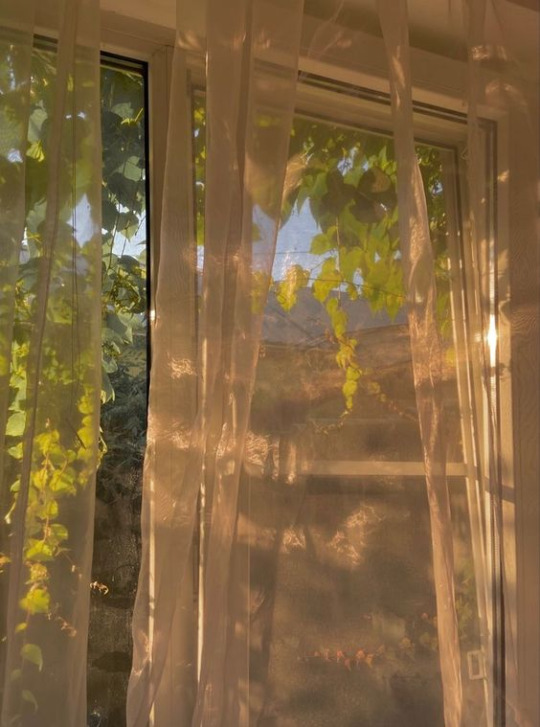

about me
i'm ari. she/her. nicknames welcome. go wild. dude/bro/girl/literally anything is also fine. i use 'lol' and '<3' too much. minor. literally the biggest procrastinator and so disorganised i dare u to find someone worse than me. i'm indian but i live in australia. bengali/north indian idk. band kid :D my pinterest is here. PLEASE DM ME IF U WANT TO. I NEED FRIENDS. IM AWKWARD AND BAD AT MAKING CONVERSATION BUT STILL PLS 😭😭😭
personality/star sign or whatever
according to the mbti test here i am an istp-t. i am also a cancer. i found out my sun, moon and rising signs and the marauders version and i wrote it down and lost it so then i redid it and i lost it again so i can't bother at this point someone help me :(
time zone
Australian Eastern Standard Time (AEST) i think?? SUCK ON THAT AMERICANS AND WHOEVER ELSE EHHEHEHHEHE ;LSDJFSFJIJFDJF;LJ

my music taste
i love taylor swift, conan gray, olivia rodrigo, sabrina carpenter and honestly a lot of other stuff lol. also love bollywood music.
favourite books and authors
i love reading and i'm usually a really fast reader lol. i love harry potter (fuck jkr tho), kotlc, chetan bhagat books, the inheritance games, agggtm, literally all of karen m. mcmanus's books, the divergent series, pjo and hoo, lorien legacies, the selection, powerless, soc, girl in pieces, dictionary of lost words and bookbinder of jericho, all the books by amish, and a bunch of other books.

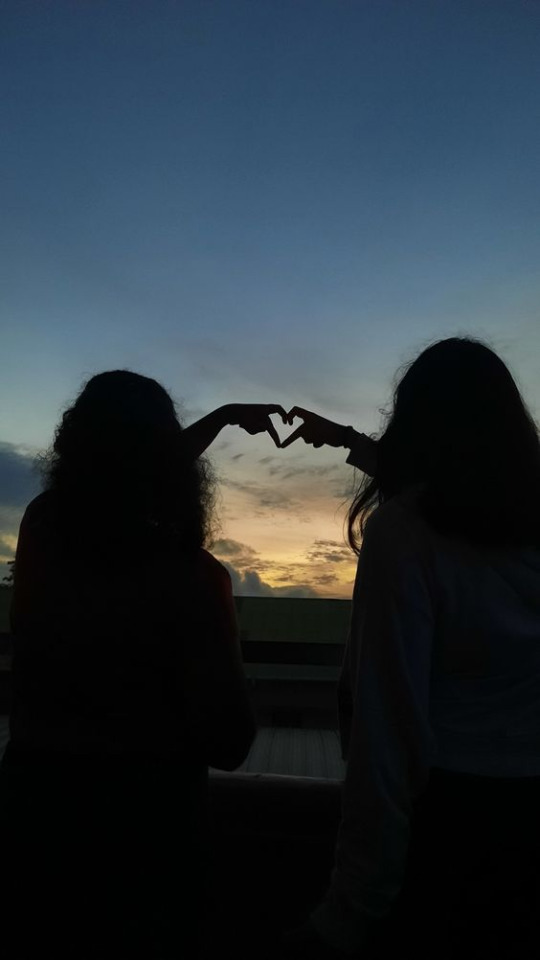
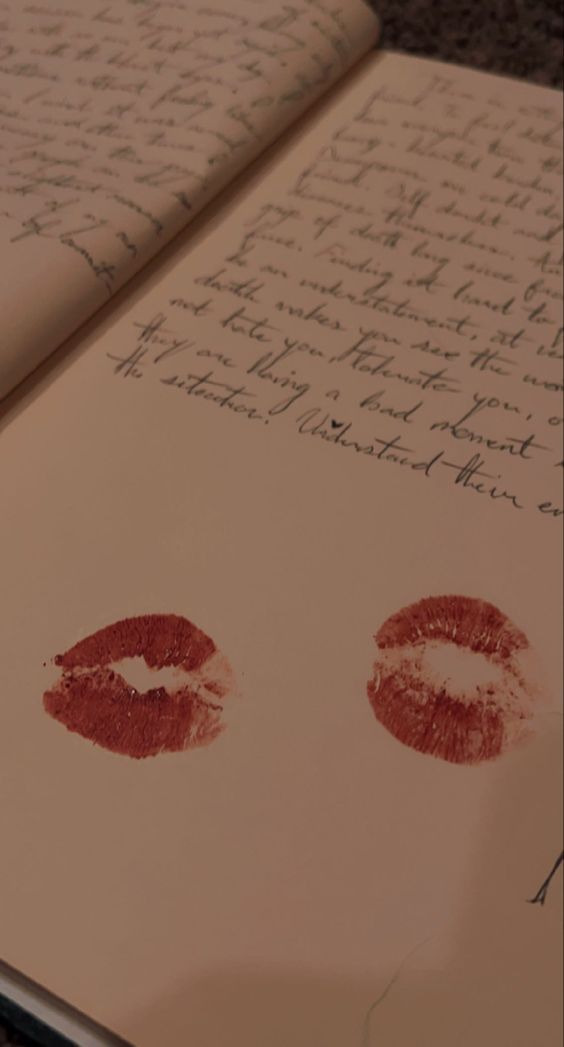

dni
idk the usual?? if u think ppl arent valid or you're literally an asshole. honestly you all can go get stuffed. idgaf
tag games and shit
yes you can absolutely tag me. i love tag games and chain asks. sometimes i may not get to doing it but i usually will and it makes me so happy when i'm tagged lol
tags
i don't post that much stuff so i don't really have mulitple tags for my posts. anything or any shitposting or thoughts will be tagged #ari's shit. for asks it's #ari gets an ask?
fandoms!
i'm literally obsessed with drarry but i'm mostly part of the marauders fandom. i'm starting to make my way through all of the marauders fics. i love love love hermitcraft. i'm an ethogirl literally who doesn't love etho?? also really into trafficblr. i literally love six of crows so much like omg. desperately trying to get through the magnus archives im only 8 years late haha i also love kotlc sm. (team foster-keefe forever!) i'm low-key in love with keefe sencen cause omg. aaaand also a bunch of other shit but those are the main ones idk bro

i'm bored and this is too long already might as well add more so here are a bunch of userboxes :D














and that's all not because i have self control but because there is a limit to images per post 😭😭😭 i literally had to delete some of my aesthetic images for this soooo

all the above photos are not mine, i got them off of pintrest.
my profile pic is obviously from the makowka picrew here
the beautiful dividers are linked here. these are by @saradika-graphics she is a literal star these dividers are so good
IK THIS IS WAY TOO FUCKING LONG AND I KEEP ON ADDING SHIT MORE SHIT SO IF U ACTUALLY LIKE READ TO THE BOTTOM THIS HERE IS FOR U LMFAO ILYSM <333333
82 notes
·
View notes
Text
Recent reads - women in translation
Child of Fortune - Tsushima Yuko, 1978, tr. Geraldine Harcourt
Orignally published in Japanese. A single mother with a difficult relationship with her 11 year old daughter finds herself pregnant again after an affair. A dreamy and flashback-centred short story of motherhood and alienation.
The Mermaid’s Tale - Lee Wei-Jing, 2019, tr. Darryl Sterk
Originally published in Mandarin. A lonely woman in her thirties with an obsessive love for Latin dance attempts to make peace with her past and her body. Blends the whimsical and the excruciatingly real.
Consent - Vanessa Springora, 2020, tr. Natasha Lehrer
Originally published in French. A wrenching memoir of the author's sexual abuse by a celebrated author as a teenage girl, and the culture that colluded with her abuser. Devastating.
A Woman of Pleasure - Murata Kiyoko, 2013, tr. Juliet Winters Carpenter
Originally published in Japanese. In 1903, a teenage girl tries to survive after being sold into sex work. The novel's brutality makes its moments of light even more poignant.
Masks - Enchi Fumiko, 1958, tr. Juliet Winters Carpenter
Both a novel of tragedy and manipulation and an exploration of the role of women in noh theatrical tradition and the Tale of Genji. Lingers in the mind long after reading.
Abandon - Sangeeta Bandyopadhyay, 2013, tr. Arunava Sinha
Originally published in Bengali. A mother's conflict between caring for her sickly young son and her desire to abandon motherhood to pursue her art is personified by two narrations by the same "character". A fascinating self-referential novel that raises many questions on the conflicts between art and humanity.
21 notes
·
View notes
Text
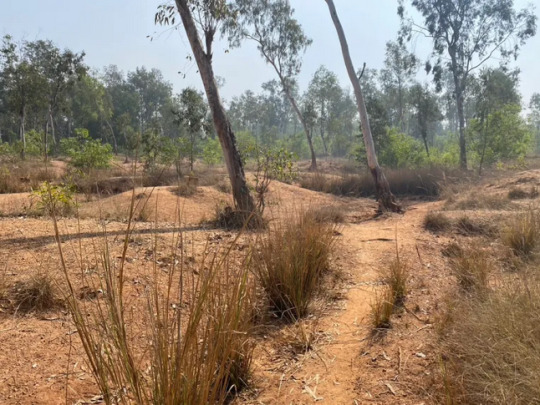
The “khoai” is the name colloquially given to [...] landmasses in and around the Chotanagpur Plateau in eastern India. Rich in iron oxide, these [...] soils are marked by a rugged and often undulating topography, resulting from millennia of erosion from monsoon rains, the many winding rivers that populate the region and action of winds from summer thunderstorms, popularly termed in Bengali as “Kalboishakhi.” The winds and the rains of the kalboishakhi dance across the lands adjoining the Bay of Bengal, often arriving at the horizon with ominous dark clouds right before sunset. [...]
The khoai is a charismatic frontier in an ongoing conversation within South Asian developmentalist imaginaries that call for optimal land use for the purposes of economic growth. [...] As the lateritic soil of the region is not suited for intensive agriculture, efforts have been made to make vast sections of the region arable [...]. And so, slowly, the red soils get taken over the green [...]. This is often done by breaking gullies and hoodoo-like structures [...] to flatten the lands [...]. The ongoing project to turn such “deserts” green has a long history. Yet alongside these projects, is the place that the khoai have in the literary, cultural, and spiritual imagination of many [...] that inhabit the Chotanagpur Plateau. The vastly open and hilly topography, dotted with sal forests [...] has often been the fodder for songs of longing [...]. The horizon of the sky meeting the red gullies of the badlands also form many a narrative that appear in local folk songs and stories. [...] They have also been sites of community-based agroforestry.
---
Recently, such badlands have been termed unproductive in and around my hometown of Santiniketan, India.
As South Asian developmental imaginaries wholly absorb the understanding of terra nullius from modern Euro-American conceptions of land, the idea that “badlands” are necessarily “wastelands” become cemented. Once beloved [...], the dark brown-red hoodoos and gullies today are seen as wasted potential that are depriving the public of much-needed resources, and the possibility of the coming of civilization in accordance with upper-caste aspirations. Khoai today have become sites for proposed plantations facilitated by local forestry authorities, holiday homes and cafes [...], luxury resorts [...].
The ethos of invoking terra nullius has travelled into discourses surrounding “practicality” and the absolute necessity for villagers and small town folks in the area to be saved by their urban-dwelling upper caste counterparts [...] who are interested in their cultural practices, seemingly idyllic agricultural lifeways and the simplicity away from the stresses of cities such as Kolkata. But in this framework, the imaginaries of development are necessarily embedded in compulsory extraction, whether that be of cultural economies, minerals, timber, or land for development. [...]
[B]adlands get turned into places that need saving from being “wasted” by the carelessness and unimaginative shortsightedness of villagers and Adivasis, who are simply seen as ill-equipped to deal with the progression of the global economy.

These days, it is hard to find a piece of the “khoai” that has not been subjected to projects of agriculture, forestry, or have been subjugated to [...] property ownership [...]. As the figures of the plantation and its attendant cultures of enclosure and theft of commons creep into places previously overlooked by the tentacles of global extractive forces, many, if not most khoai areas are mobilized to be “redeemed” into productive little plots legible to capital.
I have to wonder about the processes of consent and negotiation that have informed such projects. [...] These areas were in the past predominantly inhabited by Adivasis or Indigenous peoples of India, who had resisted the [...] hierarchies [...].
Badlands such as the “khoai” present a challenge to capitalist imaginaries because they defy its temporalities and its compulsion to make all aspects of being productive and legible to exchanges that foster logics of uninhibited growth. [...]
What, then, does it mean to care for wastelands? [...]
What histories are paved over by concrete? What does development mean in places where inequality is still rife, but there are shiny new roads? What does a future look like, where we can let badlands and “wastelands” just be, as part of ecological and cultural commons?
---
All text above by: Aadita Chaudhury. "Caring for Badlands". The Otter, Network in Canadian History and Environment (NiCHE). Emotional Ecologies series. Ed. Jessica M. DeWitt and Sarah E. York-Bertram. 14 July 2023. [Photography by Aadita Chaudhury, included in the original article. Bold emphasis and some paragraph breaks/contractions added by me. Presented here for commentary, teaching, criticism purposes.]
102 notes
·
View notes
Text
Altruism in Sumeru
I've always been intrigued by the religious undertones of the Akademiya (named Sumeru Institute of Religious Decree in Chinese) and how it connects to the rest of the thematic elements of the region
Religion is a path to truth the same way knowledge is a path towards god
The interconnectedness of nature through both isn't lost on me either
This is the region inspired mainly on India, and though there's very palpable influence of Hindu and Buddhism around the nation, the Akademiya itself doesn't particularly look like the religious institutions of either
A poem of Bengali author Rabindranath Tagore is referenced in Alhaitham's teaser. Tagore is pretty known in China, placing within the 12 most known foreign authors in the country, and his work is studied in schools. That is to say, the main audience of the game could easily recognize the reference to the poem if they paid attention
I bring him up because his work might have also influenced the world building around the Akademiya as well: Tagore defines religion not as a set of beliefs, but as an expression of ideals that seek the well being of a community. His reasoning drew from Indian traditions, especially the concept of Brahman or "the universal consciousness" which originated creation and therefore exists in everything. Therefore, his worldview was one of unity with the world; nature, community, man and god as one, and this unity could only be achieved through introspection and humanistic values such as altruism. Religion is in this sense a code of ethics for the wellbeing of the community.
Tagore was a very significant historical figure in several aspects, but one that stands out is his commitment to education: he valued the arts alongside the sciences, and sought to teach children of lower classes through non conventional methods; the opposite of what Azar and the sages promoted in the game
These themes of community, education, arts, altruism all together take the spotlight in Sumeru through one character: Kaveh
Nahida says Kaveh is closest to understand what it means to be a nation of wisdom, and again this can be reinforced by the influence of Mr Tagore
Kaveh is inspired by Iranian culture, which includes the religion of Zoroastrianism. The lore around the Akademiya also takes a lot from this religion, the names of the darshans and the House of Daena are concepts in the religion
In the collection The Religion of Man, an entire chapter is dedicated to the prophet Zarathustra who founded Zoroastrianism. Tagore writes:
There can be hardly any question that he was the first man we know who gave a definitely moral character and direction to religion and at the same time preached the doctrine of monotheism
Zarathustra was the greatest of all the pioneer prophets who showed the path of freedom to man, the freedom of moral choice, the freedom from the blind obedience to unmeaning injuctions
Though surrounded by believers in magical rites, he proclaimed in those dark days of unreason that religion has its truth in its moral significance, not in external practices of imaginary value; that its value is in upholding man in his life of good thoughts, good words and good deeds
The revelation he announces is to him no longer a matter of sentiment, no longer a merely undefined presentiment and conception of the Godhead, but a matter of intellect, of spiritual perception of knowledge. This is of great importance, for there are probably not many religions of so high antiquity in which this fundamental doctrine, that religion is a knowledge or learning, a science of what is true, is so precisely declared in the tenets of the Gathas. It is the unbelieving that are unknowing; on the contrary, the believing are learned because they have penetrated into this knowledge
Tagore connects his beliefs of altruism and community, influenced by the Hindu concept of Brahma, to the virtue of sacrifice in Zoroastrianism:
It has been a matter of supreme satisfaction to me to realize that the purification of faith which was the mission of the great teachers in both communities, Persia and India, followed a similar line. We have already seen how Zarathustra spiritualized the meaning of sacrifice, which in former days consisted in external ritualism entailing bloodshed. The same thing we find in the Gita, in which the meaning of the word Yajna has been translated into a higher significance than it had in its crude form.
According to the Gita, the deeds that are done solely for the sake of the self fetter our soul; the disinterested action, performed for the sake of giving up of self, is the true sacrifice. For creation itself comes of the self-sacrifice of Brahma, which has no other purpose; and therefore, in our performance of the duty which is self-sacrificing, we realize the spirit of Brahma
Tagore also concludes:
The ideal of Zoroastrian Persia is distinctly ethical
Throughout the Sumeru chapter, we find that the meaning of wisdom isn't realized in discovering or amassing knowledge, but on using knowledge the correct way and respecting rules created for the protection of the community. In this sense, wisdom is ethics, and ethics seek collective well being like in Zoroastrianism
It isn't odd then, that all three talent books describe the motto of Zoroastrianism: good thoughts, good words, good deeds

15 notes
·
View notes
Text
Factories close as Bangladesh police clamp down on protesting garment workers — BenarNews
https://www.benarnews.org/english/news/bengali/garment-strike-11022023154700.html
Street protests by Bangladeshi garment workers who want higher wages have turned violent while hundreds of factories have shut down, crippling the industry that is an engine of the country’s export economy.
At least two people have been killed in street clashes with police since thousands of workers began striking on the outskirts of Bangladesh’s capital last week to demand that they be paid double their monthly salary. As many as 500 garment factories have temporarily closed, authorities and factory owners said Thursday.
87 notes
·
View notes
Note
Dr. Reames, a simple question from someone interested in history but who is not part of the academic world: in order to study Alexander the Great and Ancient Greece in general, how much Ancient Greek does one have to learn? Would you need to learn Demotic Greek or the many other dialects, such as the one from Macedonia? As in, you’d need to learn one or more versions of Ancient Greek?
Thank you in advance! I always enjoy your responses!
How Much Greek Do I Need to Read about Alexander?
It depends on how far you want to go…what’s your end-goal?
If you’ve no desire to make it a profession, the good news is you need very little Greek.
Most ancient Greek and Latin texts are available in translation in the major languages of (European) Classical studies: English, French, German, Italian. Now, if you want them in Polish, or Japanese, or Bengali, you’ll have more of an issue. But the Loeb Classical Library (and LOEB ONLINE) has English translations of virtually all extant (still existing) Greek and Latin sources, and if you’ve got access to a (larger) college library, they probably have them, even if you have to ask them to get things out of storage. Latin is red (PA6156); Greek is green (PA3612). Budé is the French version of Loeb, btw.

Loeb texts also have Greek and Latin on the facing page, but I mention them because they’ve got translations of (almost) everything. One can find cheaper versions without the Greek/Latin from Penguin, Oxford, et al. But those don’t have, say, Aelian, or Athenaeus, or the obscure texts of Plutarch’s Moralia. Loeb does. That said, the Alexander histories (Arrian, Curtius, Plutarch, Diodoros, and Justin) are all available in relatively cheap translations. Much earlier, in answer to a different ask, I listed our main sources on Alexander, extant and lost. It’s a longer read, but perhaps of interest.
(See below for more online sources in translation.)
So, no, you don’t need Greek. But, if you’re at least moderately serious about reading beyond pop history, you will want to learn a few Greek words to better “get” Greek sensibilities. Say, timē (τιμή), which means honor/public standing/esteem, but has all these attendant connotations. If you start reading the Serious Stuff (articles and academic books), authors will throw these around so it’s useful to know them, as they tend to carry an entire freight of meaning we don’t want to explain every time we use them. These are words I make my students learn in my intro to Greek History class (2510), so there aren’t many. (Undergrads put up with only so much, ha.) For Alexander, it’s also useful to know the Greek names of some units, such as the Somatophylakes (the royal Bodyguard of 7), or the Hypaspists (the specialist hoplite phalanx, not the same as the Foot Companions), or even the name of the long pike (sarissa). But you can make do quite well with a vocab of maybe 30± Greek terms.
It's only if you want to pursue research at the advanced (graduate) level that you’d need Greek. Even then, it’s mostly Attic Greek. The only time you’d need dialects is for quite specific study and/or epigraphy (inscriptions). Epigraphers are language specialists. Most of us, even the “pros,” don’t work at that level. But yes, if you’re getting into extensive examinations of passages, it’s good to understand the language for yourself, not have to trust a translation. Translations are, by definition, interpretations.
I hope that encourages some folks to embark on reading the original (primary) sources. Of more import for these is to understand HISTORIOGRAPHY. Even those who can read the Greek, but lack historiographic training, tend to take stuff at face-value when they shouldn’t.
Go HERE for a discussion of historiography (with regard to Alexander). Again, it’s part of a specific ask, but I explain why we need to know something about the historians who are writing our texts, in order to understand those texts. It’s another longer read, but essential.
Almost forgot! If you prefer video, I've also talked about the sources on TikTok: Part I: Intro & Lost Alexander Sources and Part II: Extant Alexander Sources
Some Useful Online Sources to Bookmark:
Perseus (at Tufts.edu): clunky as hell because it’s old (in internet years), but indispensable. English/Greek/Latin/other texts in translation and original language, plus all sorts of other tools, including an image bank. Pitfall: these are translations outside copyright, so old and sometimes problematic. Still, it’s free, and so-so much stuff here. Every person dealing with the ancient Med world has this one on speed-dial. (You can find other online sources with various texts, but Perseus has, again, almost everything; it’s the online Loeb.)
Stoa Org Static: a version of the original where you don’t have to sign in. Takes you to various super-helpful pages, including the Online Suda (a Byzantine encyclopedia you can search: look up “Hephaistion” there. *grin*) Bunch of other helpful links.
Wiki Digital Classicist hypertext list of topics ranging from the Beasley Library (of pottery) to the Coptic Gnostic Library and various online journals. Just click around, see what’s there.
Topos Text: clickable map of places which includes all references to them in ancient sources. So if, say, you want to know where X places is, mentioned in Arrian, you can find it on the map.
PHI Searchable Greek Inscriptions: I have used the tar out of this. It’s much easier than Inscriptiones Graecae, and comes with English translations.
More Online Resources: more links. This is just one of various collections out there.
Again, ALL this stuff is free. Even when you may have to pay (like Loeb Online), the amount of material you can now lay hands on even without a uni library is fantastic.
JSTOR: requires a subscription, but, if you’re a college student or can get access via a uni library, you can look up material for free. Problem: JSTOR has different subscription packages, and only the really big Class-A Research schools have large holdings for Classics. I’m regularly foiled in things I need, as my library is smaller. I use ILL (Interlibrary Loan) a lot. If you can’t get what you want via your school JSTOR or ILL, sometimes you can purchase a solo copy of an article via JSTOR Google Scholar. But (hint) always check the journal’s website itself. It might be cheaper there! (The Ancient History Bulletin, for instance, is super-cheap; check their archives. Karanos [Macedonia only] is FREE.) Same thing sometimes with books. Certain publishers have rental options, Open Access, etc.
Also Academia.edu first: Your savior…if the author is a member, and has uploaded the paper you want. We frequently face restrictions on what we’re allowed to upload, and when. Yet we may list an article we can’t yet release publicly. That doesn’t mean we won’t send it to you privately via email if you message us and ask nicely. 😊 Especially if you’re not providing an entire wishlist, or asking for a book for free. It depends on the person, and whether they have a PDF.
#asks#greek language#alexander the great#studying the classics#Classics#source on Alexander the Great#How much Greek do I need?#ancient Greece#ancient Macedonia
31 notes
·
View notes
Text
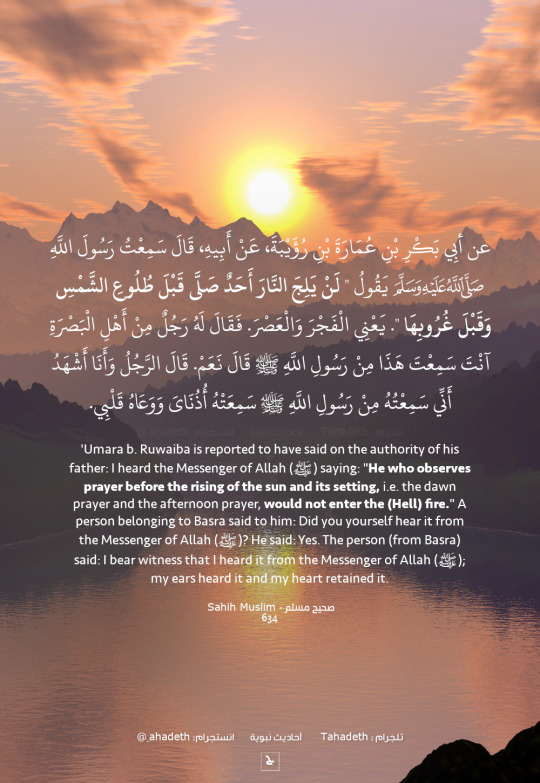
أَبِي بَكْرِ بْنِ عُمَارَةَ بْنِ رُؤَيْبَةَ، عَنْ أَبِيهِ، قَالَ سَمِعْتُ رَسُولَ اللَّهِ صلى الله عليه وسلم يَقُولُ " لَنْ يَلِجَ النَّارَ أَحَدٌ صَلَّى قَبْلَ طُلُوعِ الشَّمْسِ وَقَبْلَ غُرُوبِهَا " . يَعْنِي الْفَجْرَ وَالْعَصْرَ . فَقَالَ لَهُ رَجُلٌ مِنْ أَهْلِ الْبَصْرَةِ آنْتَ سَمِعْتَ هَذَا مِنْ رَسُولِ اللَّهِ صلى الله عليه وسلم قَالَ نَعَمْ . قَالَ الرَّجُلُ وَأَنَا أَشْهَدُ أَنِّي سَمِعْتُهُ مِنْ رَسُولِ اللَّهِ صلى الله عليه وسلم سَمِعَتْهُ أُذُنَاىَ وَوَعَاهُ قَلْبِي . صحيح مسلم حديث ٦٣٤
'Umara b. Ruwaiba is reported to have said on the authority of his father: I heard the Messenger of Allah (peace be upon him) saying: "He who observes prayer before the rising of the sun and its setting, i.e. the dawn prayer and the afternoon prayer, would not enter the (Hell) fire." A person belonging to Basra said to him: Did you yourself hear it from the Messenger of Allah (peace be upon him)? He said: Yes. The person (from Basra) said: I bear witness that I heard it from the Messenger of Allah (peace be upon him); my ears heard it and my heart retained it. Sahih Muslim 634a In-book reference : Book 5, Hadith 269
أَيْ دَاوَمَ عَلَى أَدَائِهِمَا وَخَصَّ الصَّلَاتَيْنِ بِالذِّكْرِ لِأَنَّ الصُّبْحَ وَقْتَ النَّوْمِ وَالْعَصْرَ وَقْتَ الِاشْتِغَالِ بِالتِّجَارَةِ فَمَنْ حَافَظَ عَلَيْهِمَا مَعَ الْمَشَاغِلِ كَانَ الظَّاهِرُ مِنْ حَالِهِ الْمُحَافَظَةَ عَلَى غَيْرِهِمَا وَالصَّلَاةُ تَنْهَى عَنِ الْفَحْشَاءِ وَالْمُنْكَرِ وَأَيْضًا هَذَانِ الْوَقْتَانِ مَشْهُودَانِ يَشْهَدُهُمَا مَلَائِكَةُ اللَّيْلِ وَمَلَائِكَةُ النَّهَارِ وَيَرْفَعْنَ فِيهِمَا أَعْمَالَ الْعِبَادِ فَبِالْحَرِيِّ أَنْ يَقَعَ مُكَفِّرًا فَيُغْفَرَ لَهُ وَيَدْخُلَ الْجَنَّةِ. عون المعبود لأبي داوود
في هذا الحَديثِ يَقولُ عُمارةُ بنُ رُؤَيْبَةَ رَضيَ اللهُ عَنه: سَمِعتُ رَسولَ اللهِ صلَّى اللهُ عَليه وسلَّم يَقولُ: لَن يَلِجَ النَّارَ، أي: يَدخُلُ، أَحدٌ صلَّى قَبلَ طُلوعِ الشَّمسِ، أي: صَلاةِ الفَجرِ، وقَبلَ غُروبِها، أي: صَلاةِ العَصرِ، وداوَمَ عَليهِما؛ وخَصَّ هاتَيْنِ الصَّلاتَيْنِ لِأنَّهُما أَثقَلُ الصَّلواتِ، فَقالَ لَه- أي: لِعِمارةَ- رَجلٌ مِن أَهلِ البَصرَةِ: آنتَ سَمِعْتَ هذا مِن رَسولِ اللهِ صلَّى اللهُ عَليه وسَلَّم؟ قالَ: نَعمْ. قالَ الرَّجلُ: وأَنا أَشهَدُ كَذلكَ أَنِّي سَمعْتُه مِن رَسولِ اللهِ صلَّى اللهُ عَليه وسلَّم؛ سَمِعتْه أُذنايَ ووَعاهُ قَلبي. الدرر السنية
Hadith Translation/ Explanation : English French Spanish Turkish Urdu Indonesian Bosnian Russian Bengali Chinese Persian Tagalog Indian Sinhalese Uighur Kurdish Portuguese: https://hadeethenc.com/en/browse/hadith/6215
#حديث#أحاديث نبوية#hadith#ahadeth#الرسول صلى الله عليه وسلم#محمد صلى الله عليه وسلم#رسول الله ��لى الله عليه وسلم#النبي محمد صلى الله عليه و آله وسلم#صلى الله عليه وسلم#صلاة#الصلاة#صلاة الفجر#صلاة العصر#الفجر#العصر#البردين#sunnah#hadeth#islam#prophet muhammad#prophet muhammed pbuh#sunna#prayer#pray#alfajir#alasir#fajrprayer#sun#muslim#hadith sahih
113 notes
·
View notes
Text
Keeping my earth shattering imposter syndrome at bay, let's talk about my biggest project ever. Which I probably will never complete. But I love to talk about it.
So like I have this story in my head which I call the fantasy book in my head. Its a asoiaf meets bengal kinda thing. I like to call it grimdark, my friend who I narrated the main premise to said "that's straight up horror dude"
But like yk, bengali folklore and our love of ghosts. The main character is a very complex being (not exactly human, at least not anymore.) My main characters humanity, that died before the start of the story, haunts the narrative and the being she is now.
I'm worldbuilding so hard but like, it's genuine fantasy so a lot of ghosts and of course since my Bangladesh is a riverine country, a lot of river related geography and the rivers are characters of their own.
Also this story came to me in a dream on 23rd November 2014. I was chilling in Dhaka as an 8 year old. A lot has changed since then.
Also the main characters family is basically descended from shath bhai chompa. I'm crazy. And it's a huge plot point.
Also a lot of baghs and well a lot of environmentalism. My mc is a product of environmental manipulation. It's basically mother nature sends you as a fuck you letter to the government.
Also, a "spirit" haunts my main character the whole time (like bikrom betal/vikram betal). And then there's the whole body, heart and soul symbolism.
The prologue chapter starts as a putul nach scenario. Honestly will I ever finish this? Probably not. But if I ever do, will it just be me making jabs at my colonisers, the government and every authority figure there is? Yup. Also a lot of indigenous representation cuz Bangladesh sucks at that. Yeah no wonder I'm going insane. Also my main motivation to write this is to be present at the bengali ghost Wikipedia page at the writer's section.
#valyrianscrolls#asoiaf#bengal#bengali#ghost#web weavings#writers of tumblr#west bengal#banglablr#bangladesh#bangla#bengali literature#bangla shahitto#uponnash#desi#desiblr#desi literature#ar tag pore add korbo ghum ashtese#environment#environmetalists#nature in literature#nature's corrupt daughter#spooky#bangla literature#desi tumblr
17 notes
·
View notes
Text
❀𝒔𝒕𝒖𝒅𝒚𝒃𝒍𝒓 𝒊𝒏𝒕𝒓𝒐❀
Hi there! My name is Phi, I’m from the UK and I’m currently studying a Linguistics and Languages degree. My dream is to become a Speech Therapist (also an author, translator and language teacher on the side - I have a lot of dreams, and most of them are about words!) ˚ʚ♡ɞ˚
why have I made this blog?
Since I am a distance-learning student, it can sometimes be difficult to find the motivation to study so I really hope this blog will hold me accountable and keep me productive.
I also really admire the studyblr & langblr communities and hope to make some friends who are similarly passionate about all things languages! ˚ʚ♡ɞ˚
what languages will I post about?
Languages I speak/ am currently learning:
♡ English (Native/ C2)
Posts will be tagged #english and/or #english resources
♡ Castilian Spanish (intermediate to advanced/ B2 -> C1)
Posts will be tagged #castellano and/or #recursos castellano
Please note: I refer to the language as Castilian/ castellano instead of Spanish/ español out of respect for the co-official languages of Spain and also to recognise the language’s divergence from its Latin American variants
♡ German (Beginner/ A2)
Posts will be tagged #deutsch and/or #deutsche Ressourcen
⭒ I will make posts expanding on my background with each language soon ⭒
Languages I hope to start studying soon:
♡ Scottish Gaelic
I intend to begin independent study of Gàidhlig in September - October 2024 and I’m so excited!
♡ Russian
My friend and I are going to begin buddy learning Russian in March 2025 and I can’t wait!
♡ Catalan
I’m so excited to learn Catalan but, given its similarities with Spanish, I don’t want to confuse myself. So I intend to start learning it when I have finished my degree in May 2027!
⭒ If you have any questions or advice for me based on these languages, please don’t hesitate to drop me an ask or a message ⭒
Other languages I’m interested in (warning: there’s a lot):
♡ Irish, Welsh, Scots, Cornish, Manx, Greek, Danish, Finnish, Norwegian, Swedish, Icelandic, Dutch, Italian (especially Sicilian), Cherokee, Navajo, Guarani, Xhosa, Afrikaans, Korean, Yiddish, Hebrew, Bengali, Basque, French, Monegasque, Portuguese, Arabic, Ladino, Old/ Middle English, Hawaiian, Cantonese
What are my other passions?
♡ Books and poetry (I have a book blog @phireads if you’re interested)
♡ Writing
♡ Fibre arts (mainly knitting, crochet and sewing - though I really want to try embroidery and beading)
♡ Baking
♡ Reading
♡ Language conservation
♡ Wildlife (especially British, especially birds)
♡ Period Dramas
♡ History (with a focus on fashion history)
♡ Classics (as in Greco-Roman, my study buddy is a marble bust of the Greek poet, Homer, who is the namesake of this blog)
⭒ That’s all for now, I’ll be regularly posting study content at the end of September with the start of the academic year. So excited to meet you all! ⭒
9 notes
·
View notes